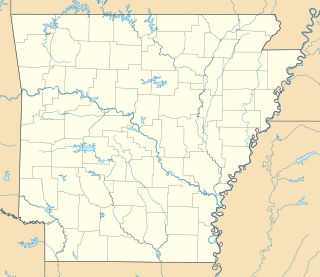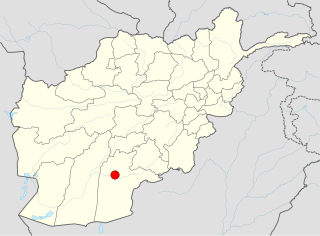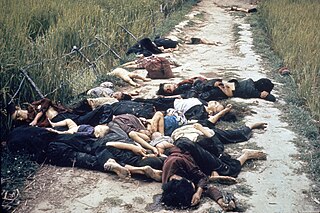 W
WThe Amiriyah shelter bombing was an aerial attack that killed at least 408 civilians on 13 February 1991 during the Persian Gulf War, when an air-raid shelter, in the Amiriyah neighborhood of Baghdad, Iraq, was destroyed by the U.S. Air Force with two laser-guided "smart bombs".
 W
WThe Battle of Balangiga, also known as the Balangiga Encounter, Balangiga Incident, or Balangiga Conflict, was a battle that occurred during the Philippine–American War between Philippine forces and American troops.
 W
WThe Camp Jackson affair, also known as the Camp Jackson massacre, occurred during the American Civil War on May 10, 1861, when a volunteer Union Army regiment captured a unit of secessionists at Camp Jackson, outside the city of St. Louis, in the divided slave state of Missouri.
 W
WDuring the Dachau liberation reprisals, German prisoners of war were killed by U.S. soldiers and concentration camp internees at the Dachau concentration camp on April 29, 1945, during World War II. It is unclear how many SS members were killed in the incident but most estimates place the number killed at around 35–50. In the days before the camp's liberation, SS guards at the camp had forced 7,000 inmates on a death march that resulted in the death of many from exposure and shooting. When Allied soldiers liberated Dachau, they were variously shocked, horrified, disturbed, and angered at finding the massed corpses of internees, and by the combativeness of some of the remaining guards who allegedly fired on them.
 W
WThe Fallujah killings of April 2003 began when United States Army soldiers from the American 1st Battalion, 325th Infantry Regiment of the 82nd Airborne Division fired into a crowd of Iraqi civilians who were protesting their presence at a school within the city of Fallujah. The soldiers claimed they were receiving fire from the crowd, whereas the civilians said they were shot at first. Human Rights Watch, which inspected the area after the incident, found no physical evidence of shots fired at the building where U.S. forces were based.
 W
WThe First Battle of Bud Dajo, also known as the Moro Crater Massacre, was a counter insurgency action fought by the United States Army against Moros in March 1906, during the Moro Rebellion in the southwestern Philippines. Whether the occupants of Bud Dajo were hostile to U.S. forces is disputed, as inhabitants of Jolo Island had previously used the crater as a place of refuge during Spanish assaults. Major Hugh Scott, the District Governor of Sulu Province, where the incident occurred, recounted that those who fled to the crater "declared they had no intention of fighting, - ran up there only in fright, [and] had some crops planted and desired to cultivate them."
 W
WThe Haditha massacre was a series of killings on November 19, 2005, in which a group of United States Marines killed 24 unarmed Iraqi civilians. The killings occurred in Haditha, a city in Iraq's western province of Al Anbar. Among the dead were men, women, elderly people and children as young as 1, who were shot multiple times at close range while unarmed. It was alleged that the killings were a response to the attack on a convoy of Marines with an improvised explosive device that killed Lance Corporal Miguel Terrazas.
 W
WThe Huntsville massacre refers to the execution during the Civil War of nine local men, including three Confederate soldiers, by Union soldiers on January 10, 1863, in Huntsville, Arkansas. No formal charges were filed, and the commanding officer was later discharged by the US Army. The prisoners may have been suspected of being Confederate sympathizers. A few months before, guerrillas had attacked a force of 25 Union troops in the area.
 W
WThe Kandahar massacre, more precisely identified as the Panjwai massacre, occurred in the early hours of 11 March 2012, when United States Army Staff Sergeant Robert Bales murdered sixteen civilians and wounded six others in the Panjwayi District of Kandahar Province, Afghanistan. Nine of his victims were children, and eleven of the dead were from the same family. Some of the corpses were partially burned. Bales was taken into custody later that morning when he told authorities, "I did it". On 23 August 2013, a jury at Joint Base Lewis-McChord in Fort Lewis, Washington sentenced him to life in prison without parole.
 W
WThe Kent State shootings, also known as the May 4 massacre and the Kent State massacre, were the killings of four and wounding of nine other unarmed Kent State University students in Kent, Ohio, by the Ohio National Guard on May 4, 1970. The killings took place during a peace rally opposing the expanding involvement of the Vietnam War into neutral Cambodia by United States military forces as well as protesting the National Guard presence on campus. The incident marked the first time that a student had been killed in an anti-war gathering in United States history.
 W
WThe Maywand District murders were the murders of at least three Afghan civilians perpetrated by a group of U.S. Army soldiers from June 2009 to June 2010, during the War in Afghanistan. The soldiers, who referred to themselves as the "Kill Team", were members of the 3rd Platoon, Bravo Company, 2nd Battalion, 1st Infantry Regiment, and 5th Brigade, 2nd Infantry Division. They were based at FOB Ramrod in Maiwand, from Kandahar Province of Afghanistan.
 W
WThe 2017 Mosul massacre, was an American bombing of the al-Aghawat al-Jadidah neighborhood in western Mosul on 17 March 2017 that killed hundreds of civilians. The incident was the largest single death toll inflicted by a coalition air strike since the 2003 invasion of Iraq by U.S. forces.
 W
WThe Mỹ Lai massacre was the Vietnam War mass murder of unarmed South Vietnamese civilians by U.S. troops in Sơn Tịnh District, South Vietnam, on 16 March 1968. Between 347 and 504 unarmed people were killed by U.S. Army soldiers from Company C, 1st Battalion, 20th Infantry Regiment and Company B, 4th Battalion, 3rd Infantry Regiment, 11th Brigade, 23rd (Americal) Infantry Division. Victims included men, women, children, and infants. Some of the women were gang-raped and their bodies mutilated, as were children as young as 12. Twenty-six soldiers were charged with criminal offenses, but only Lieutenant William Calley Jr., a platoon leader in C Company, was convicted. Found guilty of killing 22 villagers, he was originally given a life sentence, but served only three-and-a-half years under house arrest.
 W
WThe No Gun Ri massacre occurred on July 26–29, 1950, early in the Korean War, when an undetermined number of South Korean refugees were killed in a U.S. air attack and by small- and heavy-weapons fire of the 7th Cavalry Regiment at a railroad bridge near the village of Nogeun-ri, 100 miles (160 km) southeast of Seoul. In 2005, a South Korean government inquest certified the names of 163 dead or missing and 55 wounded, and added that many other victims' names were not reported. The No Gun Ri Peace Foundation estimated in 2011 that 250–300 were killed, mostly women and children.
 W
WThe Raid on Khataba, also referred to as the raid on Gardez, was an incident in the War in Afghanistan in which five civilians, including two pregnant women and a teenage girl, were killed by U.S. forces on February 12, 2010. All were shot when U.S. Army Rangers raided a house in Khataba village, outside the city of Gardez, where dozens of people had gathered earlier at the home to celebrate the naming of a newborn baby. Initially, U.S. Military officials implied the three women were killed prior to the raid by family members, reporting that the women had been found "tied up, gagged and killed." But investigators sent by the Afghan government reported, based on interviews and pictures of the scene, that the special operation forces removed bullets from the victims' bodies and cleaned their wounds as part of an attempted cover-up. NATO denied this allegation, and Afghan investigator Merza Mohammed Yarmand stated, "We can not confirm it as we had not been able to autopsy the bodies." The US military later admitted that the three women were killed by the special operations unit during the raid.
 W
WThe Río Piedras massacre occurred on October 24, 1935, at the University of Puerto Rico in Río Piedras. Local police officers confronted and opened fire on supporters of the Puerto Rican Nationalist Party. Four Nationalist Party members were killed, and one police officer was wounded during the shooting.
 W
WThe 2017 Sangin airstrike was an American bombing of the Sangin District in the Helmand Province in Afghanistan. The United Nations mission in Afghanistan stated that "initial inquiries suggest that the airstrikes killed at least 18 civilians, nearly all women and children." A spokesman for the Afghan defense ministry, Dawlat Waziri, denied the reports of civilian casualties but witnesses in the area corroborated the UN report that there were no Taliban members in the area and that U.S. troops had visited the neighborhood days before the incident. The governor of the Helmand Province also corroborated that civilians were killed following the province's own independent analysis of the incident. Elders from Sangin put the number of civilian fatalities higher at 22 killed. Brigadier General Charles H. Cleveland, a spokesman for the international coalition, confirmed that the U.S. had conducted approximately 30 airstrikes in Sangin the week prior. The airstrike was also referred to as the Second Sangin airstrike, seeing as the U.S. had previously conducted an airstrike in Sangin in July 2010 that killed numerous civilians.
 W
WThe Sơn Thắng massacre, [ʂəːŋ˧˧ tʰaŋ˦˧˥]) was a massacre conducted by the United States Marine Corps during Operation Imperial Lake on 19 February 1970, in which five women and 11 children were killed. The Marines reported the civilians killed as being Vietcong (VC) killed in a firefight. These incidents were reported by civilians and charges were brought up against the Marines. Four Marines were court-martialled and one was sentenced to 5 years in prison and the other to life, but Major General Charles F. Widdecke reduced each sentence to less than year.
 W
WThe Tokhar Massacre, occurred on 19 July 2016 in the village of Tokhar, during an offensive by United States-backed forces near the city of Manbij in Aleppo Governorate, and carried out by the United States Air Force. The operation was carried out as part of the American-led intervention in Syria. Reports of the death toll varied, ranging from 56 to 212 civilians being killed with "entire families" pulverized.